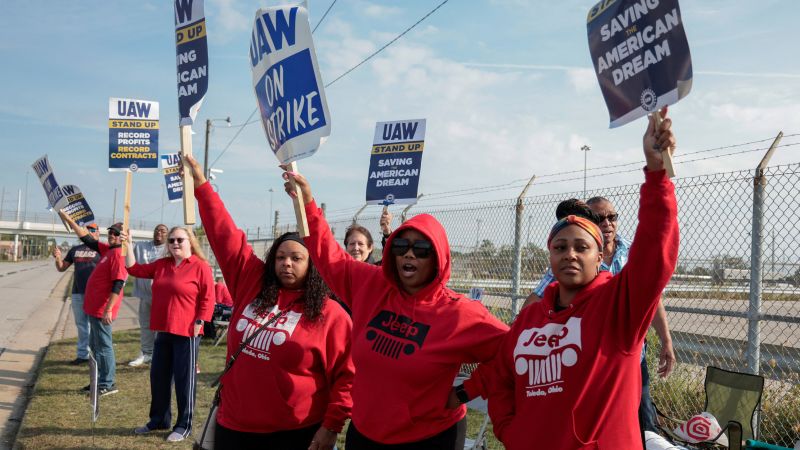As important as wages and benefits are in the unprecedented United Auto Workers strike against General Motors, Ford and Stellantis, nothing is more important than job security.
And so it is significant that UAW President Shawn Fain said the union has made major progress recently in negotiations on the issue with Ford.
When Fain announced an expansion of the strike against GM and Stellantis, he specifically exempted Ford because of that progress.
Fain said Ford agreed to up to two years of pay and health benefits for workers affected by layoffs and plant closings, as well as agreeing for the first time to grant the union the right to go on strike to protest a plant closing. Labor deals typically have a no-strike clause in effect during the life of a contract, which would prohibit the union from using that tool to fight factory closing plans.
“I don’t have to tell you that this is an important victory in our fight to save our jobs, keep families together and keep our communities from being gutted,” Fain said.
The UAW hasn’t disclosed more details on job security discussions with Ford. And Ford cautioned that there is no firm deal on any part of the contract until there is an overall tentative agreement.
“Although we are making progress in some areas, we still have significant gaps to close on the key economic issues,” Ford said in a statement in response to Fain’s message to members. “In the end, the issues are interconnected and must work within an overall agreement that supports our mutual success.”
While Fain said that neither GM nor Stellantis had moved toward accepting the union’s job security demands, once the UAW reaches a deal with one of the automakers, the pressure will be on the other two to agree to deals along the same lines.
Job security is an especially big issue in these negotiations because of the potential for future job losses that could accompany the transition from traditional gasoline-powered vehicles to electric vehicles. EVs could need up to 30% less labor to assemble than gas-powered vehicles due to fewer moving parts.
“It could be that the automakers don’t have plans to close anything during this contract,” said Jeff Schuster, executive vice president of GlobalData. “But the problem is that once (these provisions are) in there, it’ll be tough to remove. “
The risk of job loss is an existential threat to the union itself. The union is trying to expand into other industries, such as education and hospitality. But it has still lost more than 300,000 members, or 45% of its membership, in the last 20 years, due to membership declines at the Big Three. So far this century, the UAW says the Big Three automakers have closed 65 US plants and facilities, most recently a Stellantis assembly plant in Belvidere, Illinois, earlier this year.
Some of those job losses were due to outsourcing, either to plants in other countries, or in some cases to US suppliers that now do work that used to be done by the automakers themselves. Some were due to increased automation.
And much of the job losses are due to the drop in US market share by the three unionized automakers. In 1999, data from Edmunds shows the traditional Big Three had total US sales of 11.5 million vehicles and 68% of the market. By last year, that had fallen by 51% to 5.7 million US sales and only 41% of the market.
In recent rounds of contract negotiations, the union looked to get promises for investments in US plants as a way to protect jobs. The theory was that if an automaker spent tens of millions upgrading a plant, putting in tooling and equipment, it was a commitment of sorts that the plant wouldn’t close down any time soon.
For the most part, the union and rank-and-file members at the plants getting the investments were satisfied with that form of job assurances.
Investment guarantees are likely to once again be part of the contracts that end this strike.
“One thing that’s most important is job security,” General Motors CEO Mary Barra told CNN the day the strike started, “When I talk to employees…they want to know their facility is getting a new product.”
Read the full article here




